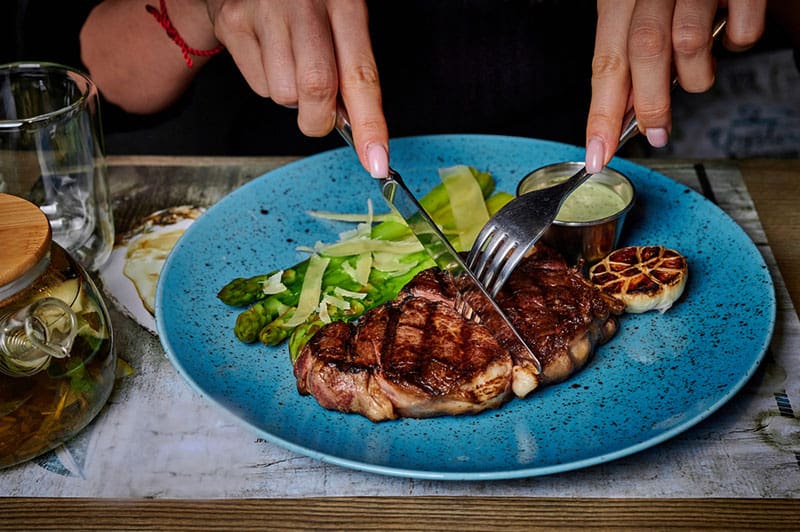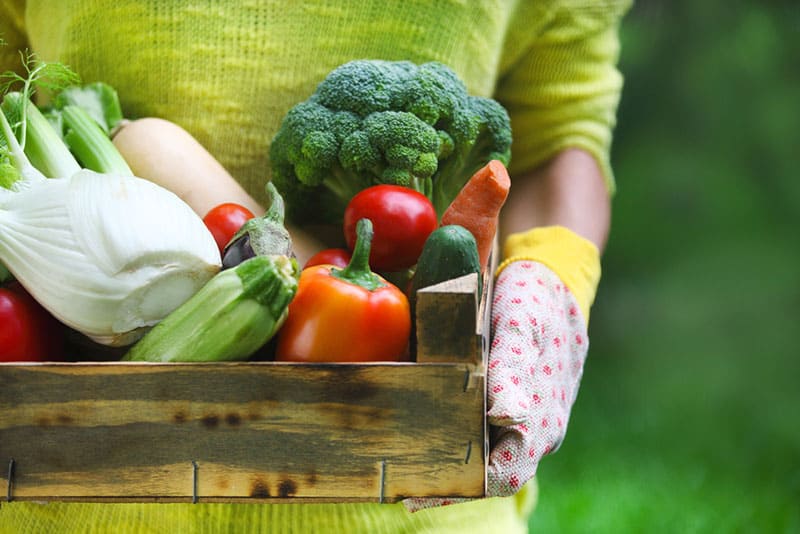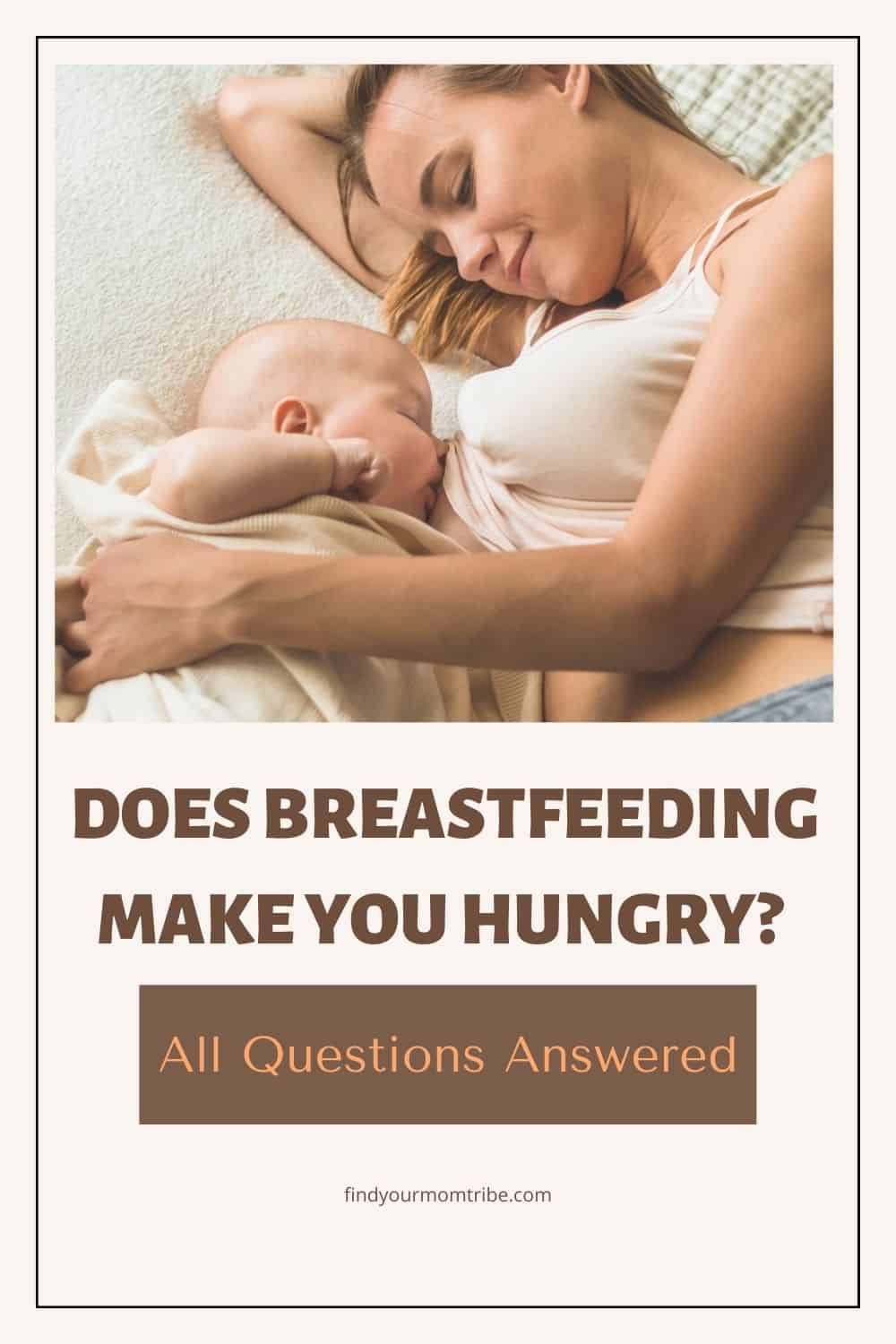Does breastfeeding make you hungry? my readers have asked me many times, and I feel like I’ve needed to provide my views on that for a while.
The short and simple answer is, yes, yes it does.
And that’s because producing breast milk involves an additional source of energy consumption for your body that must be catered to, more than what you may have been used to so far.
You’ve heard that correctly. This means that even after postpartum, in order for you to stay at a healthy body mass and still breastfeed correctly without many issues, more calories are required than that of non-breastfeeding women.
This is why I’m usually not the biggest fan of the postpartum diets that so many self-proclaimed nutritionists, know-it-all relatives, and inexperienced friends believe are necessary.
Your body needs all the energy that it can get to stay in good physical form, and that means getting in those extra calories every day.
The amount often varies based on your breastfeeding preferences and how active your milk production is, but through trial and error, you can find that sweet spot that satisfies your milk supply maintenance needs without having you feel bloated or tired.
So what does all of this entail? Well, let’s find it all out together, shall we?
Why Does Breastfeeding Make You Hungry And Why The Extra Calories?

This may come as a surprise to some of you, but a daily breastfeeding routine spends anywhere from 500 to 900 calories a day – the equivalent of walking almost 7 miles.
Insane, right? Well, a lot of things that our body does can be quite insane to process, and if you ever wonder why does breastfeeding make you hungry, this is the reason.
Remember, an average woman’s body needs an intake of around 2,000 calories daily, so 25% to 40% extra can feel a bit daunting.
But believe me, your body will always be on task and will notify you when you’re hungry and need that extra energy.
The wrong thing to do is to ignore that feeling – to push aside those hunger warning signals just because you were told to do so by the outside world.
That is one of my personal pet peeves, having physical needs reduced to a requirement for visual appeal rather than health benefits, and consciously aiming to trick people into believing that is the right way to do things – in essence, having to starve yourself.
Please, do not heed their words as gospel, but take your own needs as priority.
Some of the things they say are true (of course you should take good care of your health), but that doesn’t mean putting your body through some insane diet right after you’ve delivered a child, subjecting it to yet another bout of stress because it’s being denied its basic right: food.
It’s these ridiculous postpartum diets that end up causing a majority of problems concerning breast milk production and other physical issues within the first year of delivery.
This then makes you have to struggle with lactation issues and whether or not your baby’s going to get enough milk for the day.
Then it ends up forcing you to try and push past the limit your breasts are capable of, but not having enough energy in the body to produce any more breast milk.
It’s a trap that many new moms end up falling into since being body conscious is a somewhat newer term.
Or rather, it’s the fact that the ideal picture of health is being extremely skinny nowadays, while pregnant or breastfeeding women are at a detriment when trying to achieve that during their pregnancy period and the first year after delivery.
Mass media want to exploit a breastfeeding mother’s vulnerable state and play on her self-consciousness.
They want to make her think that she’s imperfect just for going through a pregnancy and putting on a little baby weight due to rampant hormones and spiking energy levels.
They fabricate these downright silly ideas that weight loss should be a primary concern for every mother the moment she gives birth, instead of focusing on what matters most at that time: making sure that both she and the baby are okay.
Healthy Weight Gain/Loss During Breastfeeding Is Normal

Know that just because you put on a few extra pounds of pregnancy weight, you aren’t immediately considered obese. The same weight doesn’t signify obesity for every person.
It’s a factor that’s very much dependent on age and height as well as a few other minor factors.
While the calculations often differ between men and women, and even between different women, there is a value called BMI, which stands for body mass index.
If you go to any registered dietitian or nutritionist, they can explain it a bit better, but the idea behind BMI is to show you how much percentage of your body is body fat, and the calculations differ based on height.
That’s because, the taller you are, the more percentage fat your body needs to have to maintain proper function.
It’s not something I’ve personally studied, but know that, on average, having anywhere between 18%-30% (give or take a few percent) is somewhat healthy, with the latter percentages being a slight warning sign that one is reaching obesity.
And that’s just for the average 5″3′ woman in the US. The numbers vary a bit if you’re taller than that.
But again, getting that percentage fat up or down isn’t something that’s going to happen overnight, and a little bit of weight gain shouldn’t send you into panic mode.
Mind you, there is a bit of truth in what the people out there say, but it’s directed at the wrong thing.
Yes, you should watch what you eat, but that’s not done by excluding food. You still need your daily intake of nutrients and calories.
How much that is, I cannot say for certain, but know that your body will know and warn you if need be. Your part in all of this is to make sure you have enough healthy food on hand to help keep your energy levels high.
Make your food choices relevant though.
Make sure that it’s not all junk food that comes with a lot of unnecessary and harmful additives, but rather nutritious food that comes from all of the basic food groups.
The question you should be asking yourself isn’t whether or not breastfeeding makes you hungry, but rather what sort of food you should eat when breastfeeding.
Building A Personalized Breastfeeding Diet

The best thing to do when constructing your breastfeeding diet is to calculate your required caloric intake.
If you’re the average person with an average activity level, you’ll likely need anywhere from, as mentioned before, 500-900 extra calories per day.
But, if you’re someone who’s very active or someone who doesn’t move around much (an unhealthy aspect, but understandable during this lengthy and somewhat taxing period), that number might be higher or lower.
The right thing to do is go to a registered dietitian, a lactation consultant (also known as an IBCLC), or any other registered healthcare provider to help you get more accurate numbers.
And, once again, know that your priority shouldn’t be postpartum weight loss, but rather a healthy energy intake postpartum and beyond.
It’s something that your increased hunger signifies and that you should make sure to satiate whenever you can.
Sure, you might gain some weight while breastfeeding, but that’s not something you can fully control.
If anything, one comforting fact for all breastfeeding moms is that those fat stores are used as fuel for the body to make milk for your little one to feed on.
A treat here and there, known by many as “cheat day,” can be helpful from time to time if this new diet is something you’re not used to. But just don’t overdo it – make sure to keep that blood sugar in check.
Ideal Foods For Breastfeeding Moms

Okay, so now that I’ve confirmed breastfeeding increases your appetite, now it’s time to start figuring out the best foods to eat during pregnancy and breastfeeding to help keep up with all those extra calorie requirements.
Most of these foods are going to seem rather obvious, but let’s point it out and reiterate it all just in case.
Obviously, the most important bit when constructing some sort of breastfeeding “diet” is to look at all of the potential foods that you like across the 5 basic food groups, namely:
• meats
• dairy products
• whole grains
• veggies
• fruits
While there are some exceptions to the rule like nuts, legumes, and eggs that might fall into the category of both veggies or fruits, or dairy or meats, these are the 5 that we always need to look at as healthy options.
Meat

Yes, meat is very healthy despite so many people making it seem like it’s some sort of dieting sin to consume it.
So, starting with meat , you should always have some of it on a daily basis. Not only is it a decent source of calories, it’s also your main source of protein, among other things.
Not to mention that it comes in many different variations, and is the star of many a dish.
So whether you crave red meat, poultry, or fish, know that you have a variety of options.
My personal favorite when I was breastfeeding was to have a little bit of jerky around for when I was feeling peckish and had my hands full, so I could just nibble on it until I got time to make an actual snack.
However, you can also use eggs or even peanut butter to supplement your protein intake if you’re a vegetarian.
No need to break your principles as there are plenty of alternatives, though you might need to adjust the amount that you need to take in.
Some moms even opt for protein bars, either store-bought or homemade, as an easy access food for protein and to help keep energy levels up.
These are particularly convenient if you and the little one are alone at home and you can’t quite get your hands free to make some food on the fly.
These are usually made with a bit of trail mix and peanut butter thrown in for good measure, and is where all of said protein comes from.
Dairy

We once again have plenty of good options, with milk being a really good source of vitamins and calcium.
So having a warm glass of it can really help, especially during the night when it has the added benefit of aiding sleep.
Other than actual milk, cheese, yogurt, and kefir are really beneficial too, especially the probiotic kinds of yogurt that help boost the immune system.
So they’re not just helping you meet your daily calorie intake needs, they’re also benefiting other things like gut health.
And in case you feel like yogurt on its own is a bit too bland, a quick and easy snack idea is to toss in some dried fruits, nuts, or simply a bit of trail mix.
Being creative with your food while still keeping it tasty is what helps you get through this stage and helps make some of these dietary options into a lifestyle habit.
Whole grains

Often, whole grains aren’t too interesting to eat on their own and can be rather bland, especially for people who avoid bread, but when mixed with foods from other food groups, they can be a really nice supplementary flavor.
That said, if you’re not one to go through all of these fancy processes, just stick to regular, whole grain bread when you make your sandwiches and layer them with some good stuff.
My personal suggestion is to go for the classic PB&J or BLT combos (depending on your mood, of course) as they’re quite nutritious and healthy if eaten in the right amount.
Vegetables & fruits

Veggies are a core base of any diet, as are fruits, so find some that are beneficial to you and your milk supply.
These are what people call lactogenic foods and there are lots of them out there.
The veggies that help promote better milk production quality and allow for easier breastfeeding are usually dark, leafy greens like spinach, broccoli, kale, collard greens, and swiss chard.
There are many others, mind you, but these are the ones that ought to be readily available and easiest to whip something up with.
Apart from those, carrots, beets, yams, and sweet potatoes are really good for aiding in milk production due to the presence of beta-carotene, so if you can get your hands on those, they’re sure to be a real treat.
As far as fruits are concerned, you have papayas, apricots, and figs to help in that regard.
Not only do they contain solid amounts of fiber and vitamins, but they’re also easy enough to grab and eat straight from the fruit bowl (minus the papaya, but you get what I mean).
That said, there are plenty of other veggies and fruits that benefit you despite not being lactogenic.
One of the main vegetables that comes to mind is the humble potato because of the amount of starch and healthy carbohydrates that it contains.
And, potatoes are so easy to make and have so many different ways of preparation that it would be silly to not include them in a diet.
The other good snacking food that you might want to keep around the house is popcorn. While not a direct vegetable, it is derived from one.
They’re an absolutely tasty and healthy snack with lots of fiber to help push these added calories through your system in a timely manner and leave you with less problems passing the food than with processed snacks.
Do try to avoid using microwave popcorn though, as those are a significantly less healthier option.
And, going back to fruit, you really can’t go wrong with any of them as any fruit is guaranteed to keep you fresh and healthy.
That said, nothing can beat the banana and its health benefits, seeing as it’s one of the best sources of potassium out there.
Not only that, but it goes great as a dessert option (banana splits) or if you want to mix it with something else that’s sweet. It’s just a great complementary fruit.
And of course, the modern superfood, avocado, is also on this list given how versatile and nutrient-rich it is – plenty of vitamins, healthy fats, and even potassium (though slightly less than bananas).
That said, at least it gives you some variety in your dietary habits so you’re not stuck eating the same food every single day.
Mind you, there are plenty of other options too, so take your pick.
Although, I would personally still seek advice from a lactation consultant or any other registered healthcare provider to help make a more accurate breastfeeding diet for yourself.
They’ll be able to tailor your food selection to your specific nursing and health needs.
4 Good Eating Habits To Avoid Weight Gain And Other Issues
Just because we’ve concluded that breastfeeding indeed makes you hungry doesn’t mean that the weight gain is going to stop. There’s more to it than that.
Gaining weight isn’t purely based on the food you take in, there’s a bit of psychology involved in it as well.
Namely, good eating habits and food portioning, as well as stress management play a vital role. So the question shouldn’t be Does breastfeeding make you hungry? but rather What messes with our hunger?
And these aren’t issues that are just tied to pregnancy and breastfeeding stages either, they’re lessons you should take on and implement as lifestyle choices if you’re looking to enjoy your food without having to put some hard limits on it.
1. Eliminate stress from your life as much as you can

It’s widely known that stress is man’s enemy number one these days and is the root cause of so many physical and mental disorders, as well as other health problems.
In our case, getting hit with added doses of stress ends up messing with our internal metabolism, as all that tensing up makes us hungrier than we need to be.
This all leads to our body signaling us to crave for some comfort food, and can cause digestive issues like constipation, diarrhea, or sometimes even stomach ulcers – all of which are typically attributed to either weight gain or an overall unhealthy lifestyle.
These abrupt reactions tend to either expel nutrients before they’re fully absorbed or keep the waste inside the body for too long that it starts causing issues.
If you’re someone like me who ends up suffering all of the effects of stress through her stomach, you’ll know what I’m talking about.
It can be a real pain when you’re dealing with a child too when those stomach cramps start kicking in (and they aren’t coming from menstrual pains).
So do what you can to eliminate the stress that surrounds you in everyday life.
I’ve found that organizing everything I do in a week helps paint a clearer picture and allows me to pinpoint my sources of stress, so you might want to start from there.
Then, when you’re done, you get to breathe a sigh of relief as you end up with a lot less stress and much more time to just relax.
2. Eat more often, but in smaller portions

One other thing that may surprise you is just how the body functions when digesting food.
It’s not just about getting 2,000-odd calories in and calling it a day, but how and when you get them in that matters.
While we have our three square meals a day where we get most of our calories from, you might find it hard to scarf down that much food in one sitting when you have to add an extra 500-900 to that count.
It’ll act as a nutrient bomb on your body and leave you dazed and lethargic as your bodily functions slow down to help digest it all.
It’s the same reason you don’t do one 2,000-calorie meal a day, as I’ve specified a bit earlier.
That’s because you want your metabolism working throughout the day at a low operating pace so that it’s always helping move the food along and absorbing what nutrients it needs from it.
Doing it all at once clogs the system up and ultimately ends up ruining your motivation and productivity for the day.
When I was breastfeeding, for instance, I used to do 5 meals a day up from the usual 3, dividing the calorie amounts somewhat evenly, with a bias toward breakfast to have the necessary fuel for the day.
The in-between foods were usually lighter snacks or half the portion of the lunch for the day with a healthy dessert near the end.
Mind you, I never kept up an exact calorie count, but it worked out more than fine in the end given my usually active lifestyle, so I maintained a healthy weight and only bothered with dealing with my baby weight after my son’s second birthday came along.
This way, I never really felt burdened by the extra calories and could resume going about my day without any major interruptions or feeling ill.
3. Spend as little energy as possible

While it might sound difficult given how maternity leave isn’t exactly generous in the US, I’d suggest trying to keep to as little strenuous activity as possible.
The less energy you have to expend, the less calories you have to consume to keep yourself in a healthy state, which means less weight gain.
Also, you’ll end up feeling a lot less sick.
Nobody wants to go from exhausted, to nauseous, to exhausted again.
This partly plays into the two previous suggestions as well, as stress is one of the more likely perpetrators of making you expend more energy due to a more hectic lifestyle.
4. Don’t cut food out of your daily intake

The one thing I keep preaching on in this article is that the idea of postpartum diets shouldn’t be to eliminate food from your daily intake, but to rather add more of it and keep it as healthy and as nutritious as possible.
Try not letting the pressure from the outside world get to you and instead trust your own instincts, or in this case, your gut, literally.
The perfect model of a healthy and happy mom isn’t a skinny one, because it’s not based on looks alone. It’s a mom who takes responsibility for taking care of both herself and her little one at the same time.
And in this case, that means eating for a person-and-a-half so you can help process that excess energy into food for your precious little baby and help him grow up to be a healthy child, with you remaining a healthy and proud mamma.
Otherwise, worrying about your physical image during pregnancy and the breastfeeding period by choosing to eliminate certain foods from your daily repertoire is only going to lead to nutritional deficiencies in the body and cause a lowered breast milk production.
Not to mention the risk of developing an eating disorder, which is only going to make life so much harder for no reason.
Believe me when I say that it’s not worth it.
I know a few moms who’ve resorted to that and I’ve worked with several young ones during their pregnancy who were so concerned about their image that they ended up suffering complications for it later down the line – and they all ended up saying that it wasn’t worth it.
Learn from their mistakes and don’t do the same thing, please.
The Takeaway
The question at the start of this article was a rather straightforward one: Does breastfeeding make you hungry? And the answer was rather obvious. Yes, it does.
But, that was merely scratching the surface. There were so many other points to be made and it was a much deeper topic to delve into that I felt needed addressing.
So, if there’s anything that you need to take away from this article, it’s that dieting during breastfeeding or pregnancy periods shouldn’t be done in the modern sense of denying yourself food.
Instead, you’re meant to take more food into your body because your body requires those extra calories to make the breast milk for your little one and keep it as rich and as nutritious as it gets.
Do make sure that the food you eat is both healthy and well portioned out throughout the day to prevent bloating or lethargic behavior.
That way, you can keep going without too much worry.
And naturally, if you’re still confused about what you can and cannot eat, speak to a registered dietitian or your lactation consultant and ask them for advice concerning building a healthy postpartum diet.
They’ll help you make one that’s right for you – one where you won’t have to get used to too much food that you and your body aren’t accustomed to.
Like this post? Please share or pin it for later. You can also stay in the loop and follow us on Facebook, Instagram or Pinterest.

This post contains affiliate links. Please see our full disclosure for more info.

